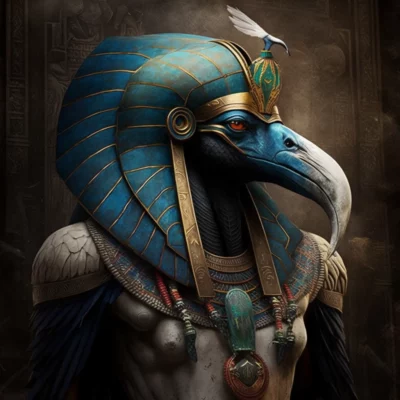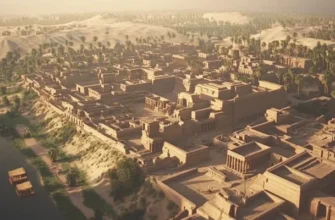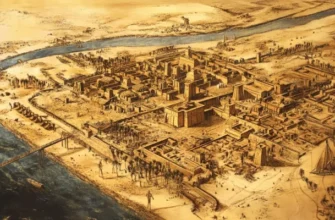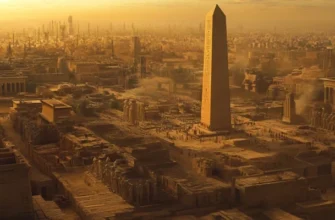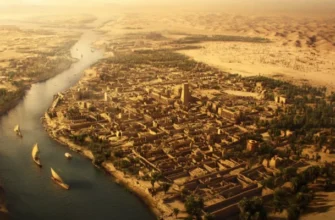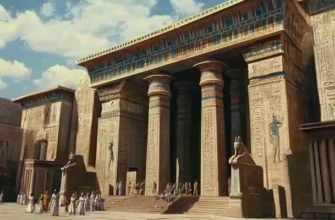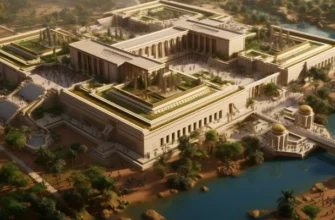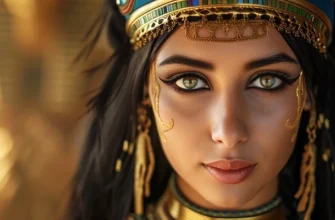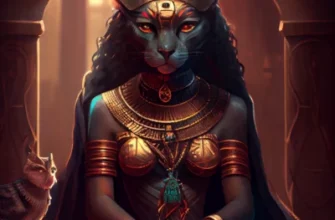Thoth is one of the most famous and revered gods of ancient Egypt. He was a symbol of wisdom, knowledge, and writing. In this article, we will look at the characteristics, role, and symbolism of Thoth in Egyptian mythology and culture.
The Egyptian god Thoth was considered the god of wisdom, knowledge, and art in Egyptian mythology. He was one of the most revered gods in ancient Egypt and his cult was widespread throughout the country. In Egyptian mythology, Thoth was depicted as a man with the head of an ibis, a bird that was considered holy.
Thoth symbolized wisdom, knowledge, and creative energy. He was the god of writing and science and played an important role in the development of writing and mathematics in ancient Egypt. He was also associated with art and literature, and his name was linked to the ancient Egyptian word “thoth”, which meant “to write”.
In Egyptian art, Thoth was depicted with a pen and a papyrus manuscript, which symbolized writing and knowledge. He was also often depicted next to other gods, such as Ra and Isis, symbolizing his important place in Egyptian mythology.
The symbolism and image of Thoth persisted in Egyptian culture for many centuries. Modern studies of Egyptian mythology and archaeological findings confirm that the cult of Thoth played an important role in the development of writing, science, and art in ancient Egypt.
Characteristics of Thoth
Thoth was depicted as a humanoid figure with the head of an ibis, a bird that was also associated with wisdom and knowledge. He had powerful wings and his head was decorated with feathers. He also had magical powers, in particular, he could perform transformations and bring the dead back to life.
Tehuti is the god of wisdom, writing, science, and magic in Egyptian mythology. He symbolizes reason, knowledge, and intelligence.
The main characteristics of Thoth:
Appearance: Thoth is depicted as a man with the head of an ibis (a large bird with a long beak). Sometimes he is depicted with a pen in his hand, as he is the god of writing.
Wisdom: Thoth is the god of wisdom and knowledge. He is the patron saint of all knowledge and sciences, including astronomy, mathematics, magic, astrology, and medicine.
God of writing: Thoth is considered the god of writing and knowledge transmitted by writing. He is often depicted with a pen in his hand, symbolizing his ability to write and knowledge.
Magic: Thoth is the god of magic and is endowed with great power. He is known for his magical abilities and the discovery of magic formulas.
Relationship to pharaohs: Thoth was also associated with pharaohs and Egyptian priests who used his magical power to maintain their rules.
Connection with other gods: He often collaborates with other gods, especially Ra, Set, and Isis. He is also the consort of Maat, the goddess of truth and order.
Thoth is one of the most important gods of ancient Egypt, and his image is found in many rituals and religious beliefs of ancient Egyptian culture.
Functions of Thoth in Egyptian mythology
Thoth was the patron saint of sages, judges, and scribes. He symbolized intelligence, knowledge, and creative energy. Thoth also acted as a creator god who helped the goddess Maat in creating the world.
Thoth (Tehuti) has very important functions in Egyptian mythology. Here are a few of them:
God of writing: Thoth is the god of writing and knowledge who passed on his knowledge to people. His symbol is the pen that he uses to write down and transmit knowledge.
God of wisdom: Thoth is also the god of wisdom, he is known for his ability to gather knowledge and study various sciences such as astronomy, mathematics, astrology, and magic.
God of medicine: Thoth is known for his medicinal properties and the use of plants to treat various diseases. He is often depicted with medical instruments and medicines.
God of magic: Thoth is the god of magic and magical abilities. He is endowed with great power and the ability to create magical formulas used to protect against evil spirits.
The god of the countdown: Thoth is also the god of time reckoning and calendar. He is responsible for calculating and maintaining the calendar used in ancient Egypt.
God of knowledge: Thoth is the god of knowledge and understanding. He is considered the patron saint of learning and research. He is endowed with the ability to investigate and understand everything around us.
God of protection: Thoth is the god of protection and security. He is considered the patron saint of magic, but is also known for his ability to protect against evil spirits and negative energy.
God of Art: Thoth is the god of art and literature. He is endowed with the ability to create and inspire. He is often depicted with musical instruments that symbolize his creativity and artistic abilities.
God of creation: In some versions of Egyptian mythology, Thoth is considered the creator of the world. He is endowed with the ability to create new life and prosperity.
In general, Thoth is the god of knowledge, wisdom, magic, healing, communication, protection, and creativity. His functions in Egyptian mythology are very important and diverse, which indicates the high esteem in which the Egyptians held this god.
Symbolism of Thoth and his attributes
In Egyptian mythology, Thoth is represented by a variety of symbols and attributes that help to identify him and describe his functions. Here are some of them:
Ibis: Ibis is a bird that is the primary symbol of Thoth. This bird is known for its long, flexible neck and long claws. The Ibis is a symbol of wisdom and knowledge, which are the main aspects of Thoth.
Books: Thoth is often depicted with books or with important texts in his hands. This reflects his role as the god of magic and literature, who possesses the knowledge and skills necessary to protect against evil spirits and negative forces.
Ritual tools: Thoth is also often depicted with ritual tools such as a rod and ankh. The rod symbolizes his power over magic and healing, and the ankh is a symbol of life and immortality.
Musical instruments: Thoth may be depicted with musical instruments such as a banjo or flute. This reflects his role as the god of art and creativity.
Kheper: Kheper is the god of the early sunrise and is often depicted with the head of a beetle. The latter may be depicted with the head of Kheper, symbolizing his role as the god of creation.
To summarize, the symbolism and attributes of Thoth in Egyptian mythology reflect various aspects of his functions and roles, such as wisdom, knowledge, magic, literature, healing, arts, creation, and life. Also, an important part of the symbolism of Thoth is his role as a god-mediator between the world of the living and the dead, who helps the souls of the dead find their way to the afterlife.
In addition, in Egyptian mythology, Thoth is often depicted as a pair with other gods, such as Ra, Osiris, Isis, and Nephthys, reflecting his role as a god of harmony and unity who helps to maintain the balance between the forces of good and evil.
In summary, the symbolism and attributes of Thoth reflect his various functions and roles in Egyptian mythology, as well as his important position as a mediating god and protector of humanity.
In many myths, Thoth was depicted with a book, symbolizing his knowledge and wisdom. He also held his attributes – an eternal golden rod and a tablet on which all knowledge and magical formulas were written down.
The role of Thoth in Egyptian culture
The cult of Thoth was widespread throughout the country and was one of the most important in Egyptian mythology. Many temples were built in honor of Thoth, and his name was used in various magical formulas.
The Egyptian god Thoth (or Tekhut) was considered the god of wisdom, knowledge, science, literature, and art. In ancient Egyptian mythology, Thoth was also the god of the moon, writing, medicine, and magic.
In Egyptian culture, Thoth played a very important role. It was believed that he was the creator of all living and non-living things on earth, including gods and people. He was also considered the protector of writers and was often depicted with a writing instrument in his hands.
He was considered the god of sciences, knowledge, and arts, so he was revered as the patron saint of scientists and artists. There were many temples of Thoth in Egypt, and one of the most famous, the Temple of the Bird in Memphis, was considered the most important center of the Thoth cult.
Thoth was also associated with magic and magical knowledge, and his name was used as an incantation to protect against evil spirits and negative energy.
Thus, it can be said that Thoth played an important role in Egyptian culture as a god of wisdom, writing, art, and sciences, and his influence extended to many aspects of life in ancient Egypt.
Modern perception of Thoth and his influence on art and culture
The symbolism and image of Thoth has been preserved in Egyptian culture for many centuries. Modern studies of Egyptian mythology and archaeological findings confirm that the cult of Thoth played an important role in the development of writing, science, and art in ancient Egypt.
In the modern world, the Egyptian god Thoth still arouses interest and admiration. His role in ancient Egyptian mythology and culture is preserved in the history and study of archaeological sites, as well as in modern scholarly and popular books about ancient Egypt.
Thoth continues to have an influence on art and culture in the modern world. His image is used in a variety of artworks, from painting and sculpture to movies and video games. His name is also used as the name of various scientific and educational institutions, as well as in the names of companies and brands.
In addition, the Egyptian god Thoth continues to have an influence on modern culture because of his importance as the god of wisdom and science. His image is often used in advertising and marketing to position companies as leaders in their industries and to protect their intellectual property.
Thus, it can be said that the Egyptian god Thoth continues to have an influence on modern culture and art because of his significance as a symbol of wisdom, science, and art.
Conclusion.
Thoth was a god who symbolized wisdom, knowledge, and creative energy in Egyptian mythology and culture. His cult was widespread throughout the country, and his symbolism has survived for centuries. Thoth’s role in the development of writing, science, and art in ancient Egypt is extremely important, and research into his cult and symbolism continues to this day.
The Egyptian god Thoth played an important role in the mythology and culture of ancient Egypt. He was the god of wisdom, magic, science, and literature, which was reflected as the writing of symbols and the verbal presentation of knowledge. Thoth was also the god of balance, who kept everything in life in balance, from the sun and moon to justice and power.
Thoth was highly revered in Ancient Egypt, his image was often depicted on the walls of temples and tombs, and statuettes and amulets were made with his image. This god had his own cult, and his priests were among the most influential and famous in the country.
Today, the Egyptian god Thoth continues to arouse interest and admiration around the world. He has influenced art, culture, and science, and his image remains a symbol of wisdom, knowledge, and balance. In general, the role of the Egyptian god Thoth in the history and culture of Ancient Egypt is very important and interesting to study.
